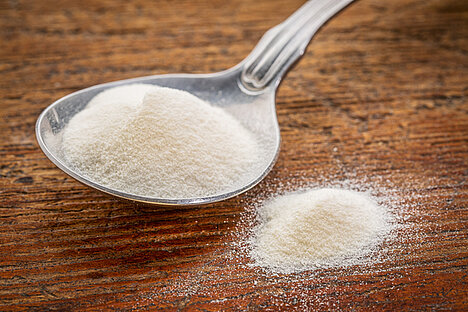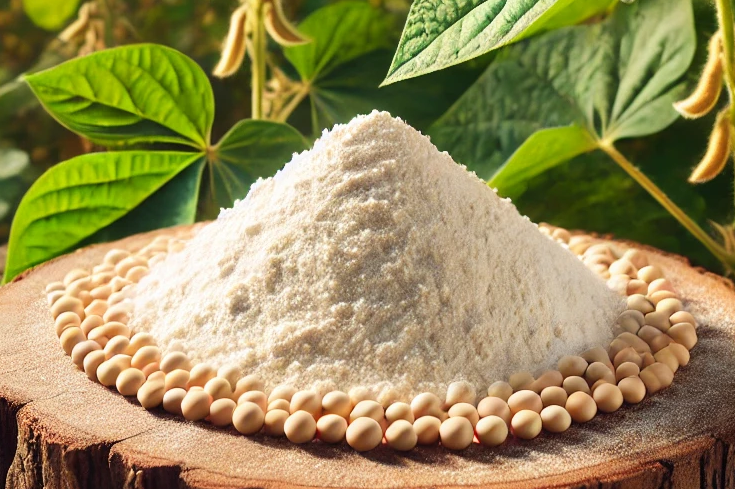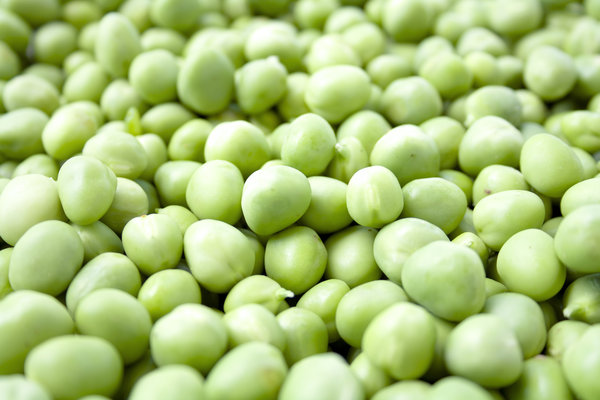Sodium caseinate

What is sodium caseinate?
Sodium caseinate is a product obtained from casein. Casein is the main protein component of milk that is processed into cheese and does not end up in the whey. Casein consists of a mixture of several proteins (αS1-, αS2-, β-, κ-casein) and is used to store and transport protein, calcium and phosphate to the newborn.
To produce sodium caseinate, casein is neutralized with an alkali to make it water-soluble. The result is a white to cream-colored powder that consists of almost 90% protein. Sodium caseinate also contains all the essential amino acids, which explains its high biological value and nutritional properties.
What are the benefits of sodium caseinate for dogs?
Sodium caseinate is mainly used as a food additive to improve the texture, taste and shelf life of various products. It has the ability to bind water, form gels and emulsify fats. It can also be used as a foaming agent or stabilizer.
For dogs, sodium caseinate can have several benefits, such as
- It can increase the protein quality of the food as it is a high quality protein source.
- It can increase the moisture of the food, which can aid acceptance and digestion.
- It can improve the consistency of the feed by creating a creamy or gel-like texture.
- It can enhance the flavor of the feed by bringing out the milk flavor or masking other flavors.
What are the disadvantages of sodium caseinate for dogs?
Sodium caseinate is generally a safe and harmless food additive for dogs. However, there are some potential disadvantages or risks that you should be aware of, such as:
- It can trigger an allergic reaction in some dogs, as casein is one of the most common triggers of cow's milk allergy. Symptoms of an allergic reaction can include skin rash, itching, diarrhea or vomiting.
- It can cause intolerance in some dogs as they may have difficulty digesting milk proteins. Symptoms of intolerance may include bloating, abdominal pain or diarrhea.
- It can cause hypernatremia in some dogs as it contains a lot of sodium. Hypernatremia is a condition in which the sodium level in the blood is too high. This can lead to dehydration, thirst, confusion or seizures.
Sodium caseinate is a milk derivative that is used as a food additive. It has various functional properties that can improve the quality of the food. However, it can also lead to allergic reactions, intolerances or hypernatremia in some dogs.
If you notice any signs of hypersensitivity or poisoning in your dog, you should see your vet immediately. We are not a substitute for a vet, but we try to be as accurate as possible. Every dog reacts differently and we recommend you get a second opinion or consult your vet if in doubt.
Stay healthy and take good care of your four-legged friend!😊
Similar to Sodium caseinate
The benefits of whey protein for dogs Whey protein has several positive effects on the health and well-being of dogs. Here are some of them: Whey protein supports muscle building and recovery after...
Soy protein isolate is a highly concentrated protein obtained from soybeans. Various processing steps are used to remove fats, carbohydrates and other components, resulting in a product with a...
Pea protein has several advantages for dogs that make it an attractive ingredient. Firstly, pea protein is hypoallergenic, which means that it does not trigger allergic reactions. This is...
Lactose is a so-called disaccharide, i.e. it consists of two simple sugars: glucose and galactose. In order to digest lactose, the body needs the enzyme lactase, which splits the lactose into its...



